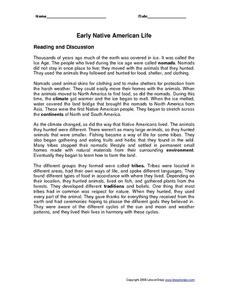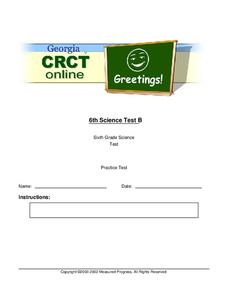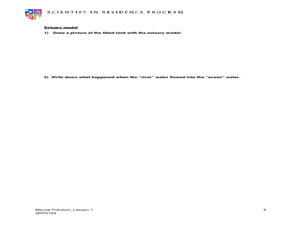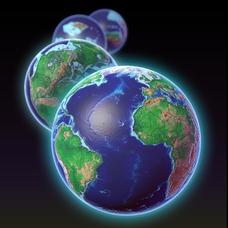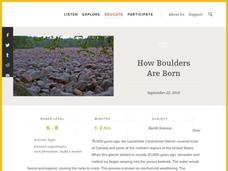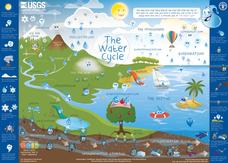Parkway Schools
Phase Changes and Heat
For this phase changes learning exercise, students use the specific heats for different substances to determine how much heat is needed for those substance to change phases. This learning exercise has 9 problems to solve.
Curated OER
Early Native American Life
In this Native Americans learning exercise, students read and discuss a 1 page article, fill in the blanks to 6 statements, match 6 vocabulary words with their correct definitions and answer 4 short answer questions referring back to the...
Curated OER
Different Types of Changes (1.2)
In this recognizing different types of changes worksheet, learners answer questions about such things as reversible change, irreversible process, climatic change, filtration process, physical change, and change in the state of a...
Curated OER
Earth's Ecology
Students investigate the three states of water. In this physical science lesson, students watch the video "Earth's Ecology" and observe water in its' three states. Students record observations.
Curated OER
Sixth Grade Science Test
For this science worksheet, 6th graders take a multiple choice quiz about properties, energy, formulas, and more. Students complete 30 questions total.
Curated OER
Physical vs. Chemical Changes
In this chemical reactions worksheet, students read about the differences between physical and chemical changes in substances. Then kids identify situations as either an example of physical or chemical change. Students learn how to...
Curated OER
Physical vs. Chemical Changes and "The Code"
In this chemical and physical change worksheet, students read about the differences between substances going through physical changes vs. chemical changes. They are given examples of each and evidence to look for in chemical changes....
Curated OER
Modeling Estuaries
Students create a model estuary. In this modeling estuaries instructional activity, students identify characteristics and mix water of varying densities. Students form a hypothesis, conduct an experiment, and analyze the results.
Curated OER
Matter and Energy
In this matter and energy worksheet, students identify substances as solids, liquids or gases, they use the kinetic theory to describe the motion of particles and they explain the conservation of mass and energy when a substance changes...
Curated OER
A New Phase In Town
Middle schoolers explore heat energy and how it is used to change the phase of matter, and discover that temperature does not increase or decrease until the phase change is complete. This extremely well-written plan is packed with great...
Howard Hughes Medical Institute
EarthViewer
Can you imagine Washington DC and London as close neighbors occupying the same continent? Learners will be fascinated as they step back in time and discover the evolution of the earth's continents and oceans from 4.5 billion...
Curated OER
Cool Stuff
Young scientists must place a check mark next to the answer they think is correct regarding things that are warm, cool, hard, and soft. This would be a good way to begin discussing how some things actually change states of matter...
Polar Trec
What Can We Learn from Sediments?
Varve: a deposit of cyclical sediments that help scientists determine historical climates. Individuals analyze the topography of a region and then study varve datasets from the same area. Using this information, they determine the...
Curated OER
Lesson 4: Fire, Rock, and Water
You can demonstrate the destructive force of volcanic mudflows to your early earth scientists using this lesson plan. Messy, but memorable, the two demonstrations require some preparation. Use one or both! Included is a link to activity...
Curated OER
Volcanoes!: Forecasting the Path of Mudflows
Students construct a mockup of a volcano by crumbling up newspapers and piling them into the shape of a volcano. They place a tarp over the newspapers making sure the tarp is large enough to simulate a flat area at the volcano's base....
Curated OER
For a Change
Here is a learning exercise that has young scientists think about things that been changed as a result of heating and cooling, and if they can be returned to their original form. There are seven scenarios to consider, and they must...
Information is Beautiful
How Many Gigatons of Carbon Dioxide...?
Here is an interesting infographic that presents information on the amount of carbon dioxide we can safely release into the atmosphere compared to the actual amount we have released to date.
Science Friday
How Boulders Are Born
Want your class to rock? Then try this boulder activity. Pupils learn about a specific boulder field and use edible materials to demonstrate the geological processes that formed this unique feature. Weathering, erosion, and mass...
Global Oneness Project
Witnessing Icebergs
Camille Seaman's photoessay, "Witnessing Icebergs" documents just a tip of the problem of climate change through images of icebergs in both the Arctic and Antarctic polar regions. After viewing the haunting images, viewers respond...
American Museum of Natural History
Climate Change
It actually is possible to have too much of a good thing when it comes to climate change. A slide show lesson describes how burning fossil fuels contributes to climate change. Individuals read about the scientific process and the...
Curated OER
Keeping Warm: Science Review Game
Test the class on what they know about thermal conduction, insulation, and heat. This interactive game provides 15 questions related to the science of temperature, heat, and cold. Keep your class warm with a fun review game!
Worksheet Web
Let it Snow
After reading an informational text detailing the ins and outs of snowflakes, scholars draw their own special design then work cooperatively to role play a snowman building scenario.
US Geological Survey
Water Cycle Poster
How many parts make up the water cycle? How many things on Earth rely on water as a system? Learn more about the water cycle in an informative and colorful poster. Print and hang, or project the graphic in the classroom for optimal use.
Chicago Botanic Garden
Food for Thought: Climate Change and Trophic Cascades
Learners examines the arctic food web with a short video about polar bears and an article about bears and warming temperatures. They design an arctic food web and discuss the trophic cascade that could come from climate...
Other popular searches
- Ice Cube Melting Experiment
- Melting Ice
- Melting Ice Cubes
- Ice Melting Kindergarten
- Ice Melting Investigation
- Ice Melting and Freezing
- Ice Melting Point
- Science Lessons Melting Ice
- Science Ice Melting
- Polar Ice Caps Melting
- Ice Melting Data
- Rate of Ice Melting



